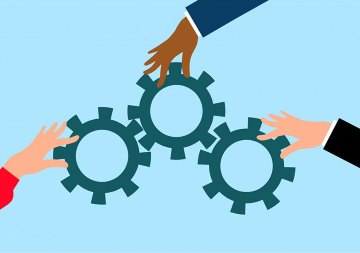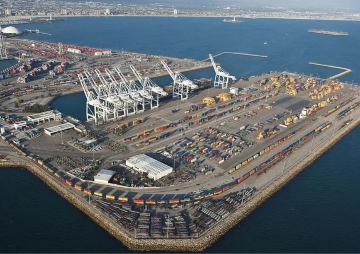Much of the world’s oceans are today under constant threat of pollution. From land sources as well as natural causes, marine litter has emerged as one of the major concerns proving detrimental to the global ocean health. In this particular context, Observer Research Foundation Mumbai hosted an interaction with Dr. Jenna Jambeck, a National Geographic explorer and associate professor at the College of Engineering, University of Georgia, on 19 September 2018. The event was organized in collaboration with the US Consulate. Presiding as the director of the Center for Circular Materials Management in the New Materials Institute at the university, Dr. Jambeck has been conducting research on solid waste issues for more than two decades with related projects on marine debris since 2001.
Giving his introductory remarks, Dhaval Desai, Vice President, ORF, underlined the critical importance of the work being done by Dr. Jambeck. He said that for India, which was endowed with the eighteenth longest coastline in the world of nearly 7,500 kilometres and being the seventh largest marine fishing nation, it is significant that the health of the oceans around us is maintained to preserve the environmental, physical and economic health of the country. “Sadly, however, this aspect is not being accorded the seriousness it deserves,” he said, highlighting that of the 2,671 million litres of sewage generated per day in Mumbai, 25 percent i.e. 655 million litres is being discharged directly into the sea and creeks each day.
A true activist-scientist and an environmental engineer-cum-advocate, Dr. Jambeck expressed her worries for two major causes of ocean pollution – unabated growth of population and rampant urbanisation. Having introduced herself as a “people-person, and not a trash-person”, she voiced her concerns on the issue of plastic as a material which “ends up in our aquatic systems through varied sources, only to further harm the aquatic life and the all-round health of the marine ecosystem”.
Having been impressed by Mumbai’s ongoing civil society-led beach clean-up efforts, which have won accolades from the United Nations, Dr Jambeck was eager to share her own participation in the International Coastal Clean-up Day 2018 at Ashtalakshmi beach in Chennai, organised by the Indian Maritime Foundation, the Environmentalist Foundation of India and the US Consulate in Chennai. “While we should be proud of how the coastal clean-ups have gained momentum in the recent past, we must strive for an environment where the need of such clean-ups does not arise in the first place,” she said. In this regard, the causes of ocean pollution, she said, must be studied closely to accentuate sensitization among people.
Having conducted public environmental policy as an international informational speaker for the US Department of State, Dr Jambeck remarked that ingestion and entanglement have emerged as the most common impacts of ocean pollution. “As microbes colonise the plastic floating on the surface of water while making it to smell like food, sea birds and other marine life are under direct impact of such ecological distress,” she said.
A 2015 research study on “Plastic Waste Inputs from Land into the Ocean”, jointly conducted by Dr Jambeck and her colleagues, stands as an integral data source, since it deliberates over per person waste generation rates, quantity of plastic-waste and proportion of mismanaged-waste, to conclude that over a quarter of a million tonnes of plastic is floating on the surface of world’s oceans, with much of it going to other sinks like the seafloor, the coasts, etc.
She explained the solution framework which principally works on a bottom-up approach. To an audience comprising of environment-based organization representatives, students and urban governance researchers, she delved into the topic of ocean pollution and circled back to her days of her first international visit to an ad-hoc recycling village between Delhi and Agra. She emphasised on the need for independent and entrepreneurial waste collectors, an informal part of the economy, which could prove integral towards treating and managing solid waste. Her solution framework was holistic and comprised of measures taken individually and collaboratively towards reducing demand for plastic and “advocating the change we want to see in the world”, and collectively supporting programmes like car shares, clothing shares, etc., using alternate materials for packaging (where plastic is presently widely used) which are easy to recycle, and mutually striving for a shared stakeholder responsibility between consumers and producers of plastic to improve the global waste management infrastructure. She deliberated on the need of a global tax on the use of plastics, along with addressing concerns around its imposition. She urged for the adherence of the five C’s -- i) collect, ii) capture, iii) contain, iv) context and v) culture, which form the necessary interventions in terms of better waste generation and management.
Dr. Jambeck narrated her experiences from a visit to one of the top 50 dump sites as characterised by the International Solid Waste Association, landfills that are trying to transition to more engineered facilities, and informal sectors comprising of independent and entrepreneurial waste collectors, particularly in Vietnamese city of Ho Chi Minh. These entrepreneurs deal directly with the community in collecting discards, like the junkshops and the kabaadiwallas, she said. She also lauded the growing awareness for wet and dry waste separation in Mumbai which directly retains the value of the recyclables.
As an environmental engineer and advocate working on municipal issues, Dr. Jambeck viewed “waste management as a hyper-localised situation”, and accentuated the need of collecting data and adopting data-centric techniques to further provide holistic engineered solutions and also create awareness and debates in the public domain. In 2011, Dr. Jambeck and her team launched a mobile app by the name of Marine Debris Tracker, sponsored by the US government, which is used to collect data all over the world on litter that is picked up, additionally accessing data to develop and design interventions that are impactful to the cause.
Her experience of sailing across the Atlantic Ocean with 13 other women from the Canary Islands to the Caribbean which took a total of 19 days to sample the floating micro-plastic, is valued as one of her significant involvements in working towards adequate waste management. The talk concluded with an insightful Q&A session which majorly consisted of interrogations surrounding mismanagement of waste, behavioral aspect of stakeholders, correlation between segregation and composting at source with respect to settlements existing in Mumbai, and the concept of introducing “biodegradable plastic”.
This report was prepared by Ritika V. Kapoor, Research Intern, Observer Research Foundation, Mumbai.
The views expressed above belong to the author(s). ORF research and analyses now available on Telegram! Click here to access our curated content — blogs, longforms and interviews.




 PREV
PREV

